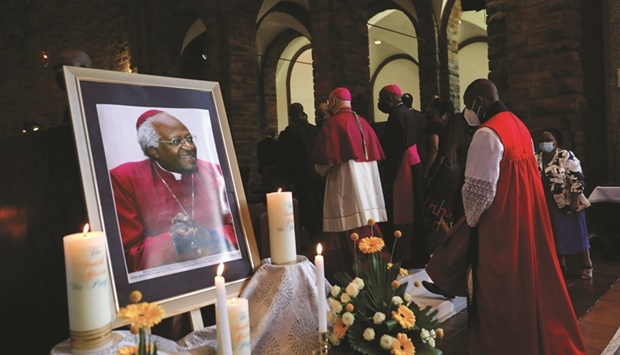South Africans streamed into Cape Town’s cathedral yesterday to pay their last respects to Archbishop Desmond Tutu, the globally venerated anti-apartheid icon, whose body lay in a modest pine coffin.
Six Anglican clerics carried the coffin into St George’s Cathedral, where the Nobel Peace laureate once railed against white rule and was formerly archbishop.
A small bouquet of carnations lay atop the simple coffin, in line with wishes for modesty expressed by the much-loved rights advocate. In sharp contrast, typical funerals in South Africa are elaborate, expensive affairs. The tireless spiritual and political leader passed away peacefully aged 90 on Sunday. He is to be cremated, with his ashes to be buried tomorrow.
Tutu’s body will lie in state until today to allow as many people as possible to say their final goodbyes.
Ordinary South Africans of all races and ages streamed into southern Africa’s oldest cathedral as soon as the doors opened to the public.
Among them was Liz Cowan, a 65-year-old white social worker, who grew up in apartheid South Africa being told that the charismatic black cleric was a dangerous man.
“He was so vilified. It was only as a teenager that I realised he was a good guy,” she recalled, standing in a queue reflecting a country that Tutu dubbed the “Rainbow Nation”.
A young girl sporting a purple top paused briefly before the coffin, making the sign of the cross in the Christian tradition.
Among the mourners was a woman wearing a purple Muslim veil — the colour many are donning to evoke Tutu’s trademark clerical robes. “He never saw you as a person of colour or any other denomination. You were all, as he always said, the ‘rainbow people’,” said Lucille Helleger, head of the Anglican women’s fellowship group in Cape Town.
Earlier yesterday, the church held a private service for the family, including Tutu’s widow Leah.The coffin was opened for the family to view the body and they sang the late archbishop’s favourite hymn, according to Tutu’s successor, Thabo Makgoba.
Following a private cremation, Tutu’s ashes will be interred inside the cathedral, whose bells have been pealing in his memory for 10 minutes at midday every day since Monday.
Tutu retired as Archbishop after 10 years in 1996 and went on to lead a harrowing journey into South Africa’s dark past as chairman of the Truth and Reconciliation Commission, which exposed the horrors of apartheid in terrible detail.
South Africa is marking a week of mourning for Tutu, with the country’s multi-coloured flag flying at half-mast nationwide and ceremonies taking place every day until the funeral.
A memorial event organised by his foundation yesterday heard from some of Tutu’s closest friends and associates including Nelson Mandela’s widow Graca Machel.
“I’ve been privileged too be very close to many of those who are gone now,” Machel said. Now “I feel like part of me has been chopped, chopped, chopped one by one as they go,” she said.
Tutu and Mandela forged a lifelong bond fighting to end apartheid.
Mandela’s eldest grandson, Mandla, urged action to improve the lot of people in democratic South Africa. “We cannot sit by idly and wonder when the failed insurrection of July 2021 will raise the next ugly chapter of chaos, mayhem and destruction,” Mandela said. “We must as a collective douse the fires... of poverty, inequality and unemployment.”
He was referring to riots sparked by the jailing of ex-president Jacob Zuma for contempt, the worst violence to grip South Africa since the end of apartheid.
Tomorrow’s funeral service will be simple in line with Tutu’s wishes.
“He wanted no ostentatiousness or lavish spending,” said his foundation, adding that Tutu even “asked that the coffin be the cheapest available”.
Weakened by advanced age and prostate cancer, Tutu had retired from public life in recent years. He is survived by his wife Leah and four children.

Archbishop Desmond Tutu’s daughters Nontombi Naomi Tutu and Thandeka Tutu watch as the casket containing his body arrives at St George’s Cathedral for lying in state, in Cape Town, yesterday.

